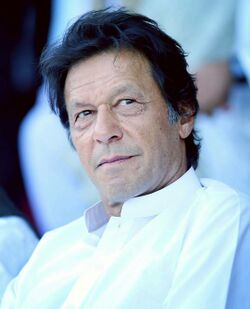Omar Sherzai
President Omar Sherzai | |
|---|---|
 | |
| President Of Gulbistan | |
| Assumed office 25 May 2007 | |
| Preceded by | Darwish Wajia |
| Personal details | |
| Born | Omar Sherzai 15 August 1955 Wezahar |
| Political party | Gulbistan National Party(2005-present) |
| Spouse | Mina Harifal(1982-Present) |
| Children | Abdul Khaliq
Miriam RahmatBaram |
| Alma mater | Thyropinia University |
| Military service | |
| Allegiance | |
| Years of service | (1987-2004) |
| Rank | Colonel |
| Battles/wars | Gulbistani Civil War Tobadad and Abalistan Insurgency |
Omar Sherzai(Mershi: ومر سیرز; born, 15 August 1955) is a Gulbistani politician and military leader who has served as President Of Gulbistan since 2007.
Early Life
Omar Sherzai was born in Wezahar, Wezahar Province in 1955 to a wealthy family. His family had strong ties to Paretian companies and leaders, and his uncle worked in the Paretian Thyropinian Colonial Government. He was educated at the University Of Thyropinia and became a powerful businessman.
Businessman
Omar would stand against Pason Paywastun's nationalization, and would lobby for support of economic liberalism. By 1973 he would first meet Darwish Wajia, and became the economic leader of the Gulbistan Irfanic Society. He would build a new petroleum business, but it would be shut down for attempt to slip through tariffs and other government regulations in 1979.
Early Political Career
In 1981, Sherzai would enter politics and found the National Movement Of Freedom. He would be arrested a month later for "Anti-Gulbistani Subversion and Attempting to Disrupt Public Order". He would be released in 1983 after two years. He would begin to donate to anti-government organizations in secret, namely the GIS. In 1985, after Paywastun's death and the rise of Marri, Wajiw would call for a Jirga and Sherzai would be in attendance. A rebellion would be declared by the tribal leaders, and the Gulbistani Civil War would begin.
Military Career
For the first two years he would mainly fund rebel forces through his wealth. He would be granted an officer position by Wajia and served with rebel military supreme commander Ahmed Badrashi. He would not see combat until 1991 at the 2nd Battle Of Asawnibad, where his unit would actually perform very well and he would gain a reputation as a military leader. He would be present for the surrender of government forces in 1995 and the establishment of the modern government of Gulbistan. He would remain in the military and became Minister of Defense from 1997-1999. He would be put in command of fighting the Tobadad and Abalistan Insurgency which had been ravaging the nation's borders since the end of the civil war. Due to lack of military experience and lack of funding from the government, he would retire in 2004 and use his wealth to promote organizations against Tribal-Irfanic Coalition.
Modern Political Career
In 2005 he would join the Gulbistani National Party, created by Aziz Shah-Khan. After a series of deadly insurgent attacks and massive outcry against President Wajia's leadership, Sherzai promised to bring and end to it. He would run in the 2007 Gulbistani Presidential Election and win. He would start his first term increasing military funding and expanding it. He would use this to begin a massive military operation in the southern half of the country, known as Sherzai's War. In 2010, the number of insurgent attacks dropped dramatically, and Sherzai began to promote economic liberalization and promoted foreign investment from numerous nations, particularly Senria. In 2010, Sherzai would bring Gulbistan into COMDEV with the intent of expanding Gulbistan's economy. He would also begin "Operation Behesht" in which he would expand Gulbistan's mining industry greatly, opening up 6 state-owned mines and allowing for foreign companies to set up mining operations within Gulbistan's Basht Tabrik mountains. Operation Behesht came under fire by rural tribesmen who would protest the opening of the mines and Sherzai would agree to close 3 of the state-owned mines after threats were made against him. The operation soon expanded into the less tribal region of Dakpesh after foreign business leaders complained about tribal threats against the mining operations. The increase in GDP and development gave him an swift victory in the subsequent elections and serve a second and third term. In 2016, a new insurgency rose in Tobadad and the GNP became majority party in the Jirgas and soon in 2017 they would vote to grant emergency powers to Sherzai. Sherzai has been criticized by many for his authoritarian nature and many claim that the GNP uses Sherzai's emergency powers to weaponize the National Security Protocol against political dissidents and rivals.

